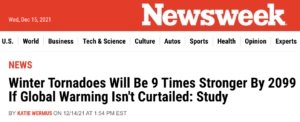RCP8.5-as-BAU + what-just-happened = 😀😀😀
Winter tornadoes will be 9 times stronger by 2099 if global warming isn't curtailed: Study https://t.co/nqhq4b8IhD
— The Honest Broker (@RogerPielkeJr) December 15, 2021
Maybe if we sign another UN climate pact and enact the Green New Deal, tornadoes in 2099 will only be 4 times as strong? https://t.co/MGp0GLjHkH
— Marc Morano (@ClimateDepot) December 15, 2021
Winter Tornadoes Will Be 9 Times Stronger By 2099 If Global Warming Isn’t Curtailed: Study
In the wake of the recent deadly tornadoes that hit five states last week, a new study shows winter tornadoes will likely be nine times more powerful by 2099 if global warming doesn’t slow down.
The study, which was conducted before the outbreak, looks at how tornadoes change as global warming continues. The study focuses on the strength of massive tornadoes, not how often they occur.
Jeff Trapp, head of atmospheric sciences at the University of Illinois, Urbana-Champaign and author of the study, said if carbon dioxide levels continue to rise by 2099, rare winter tornadoes could have stronger winds, extended and broader tracks of destruction, making them nine times stronger than what they currently are.
To get his results, Trapp took conditions from two significant tornadoes in 2013 and put them into a computer simulation to see the worst-case scenario for climate change by 2100. The first tornado used was a winter EF4 tornado in Hattiesburg, Mississippi, with top wind speeds of 170 mph, which injured 82 people in February. The second was a rare spring EF5 tornado in May with a top speed of 210 mph, killing 24 people in Moore, Oklahoma.
“There is a potential for events in the future that are more intense that would not have been as intense in the current climate,” Trapp said.
…
Trapp used worst-case scenario, which the world used to be on track for, would have another 6 degrees (3.3 degrees Celsius) or so of warming between now and the end of the century. Trapp said he will soon run simulations based on a scenario closer to the current trajectory for carbon dioxide emissions of about 3.2 degrees (1.8 degrees Celsius) warming above current levels.
…
Not peer reviewed yet, it was presented in poster form at the American Geophysical Union conference on Monday as a peak at new research to be published later.




